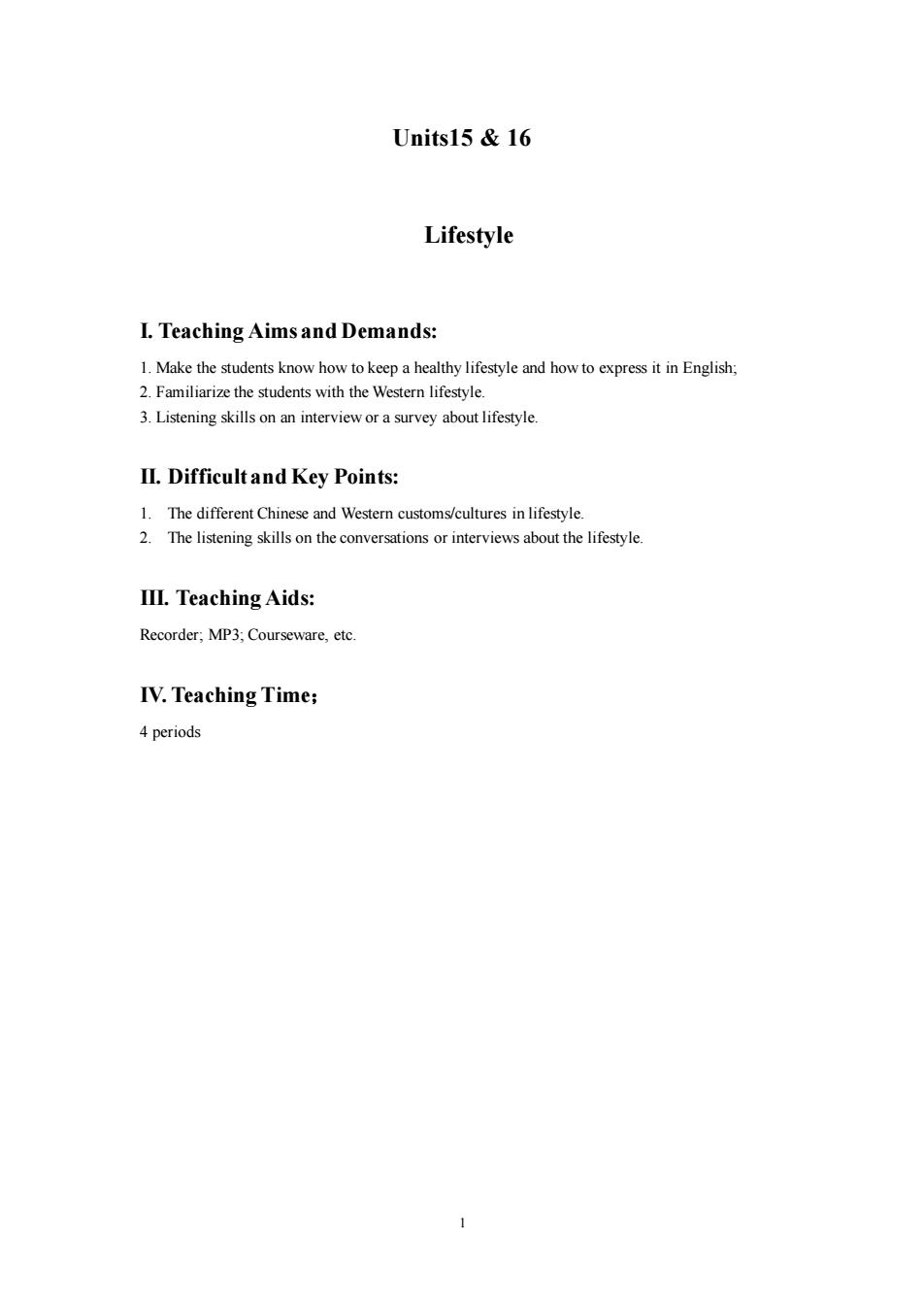
Units15 &16 Lifestyle I.Teaching Aims and Demands: 1.Make the students know how to keep a healthy lifestyle and how to express it in English; 2.Familiarize the students with the Western lifestyle. 3.Listening interviewora survey about lifestyle II.Difficultand Key Points: 1.The different Chinese and Western customs/cultures in lifestyle. 2.The listening skills on the conversations or interviews about the lifestyle III.Teaching Aids: Recorder;MP3;Courseware,ete. IV.Teaching Time; 4 periods
1 Units15 & 16 Lifestyle I. Teaching Aims and Demands: 1. Make the students know how to keep a healthy lifestyle and how to express it in English; 2. Familiarize the students with the Western lifestyle. 3. Listening skills on an interview or a survey about lifestyle. II. Difficult and Key Points: 1. The different Chinese and Western customs/cultures in lifestyle. 2. The listening skills on the conversations or interviews about the lifestyle. III. Teaching Aids: Recorder; MP3; Courseware, etc. IV. Teaching Time; 4 periods
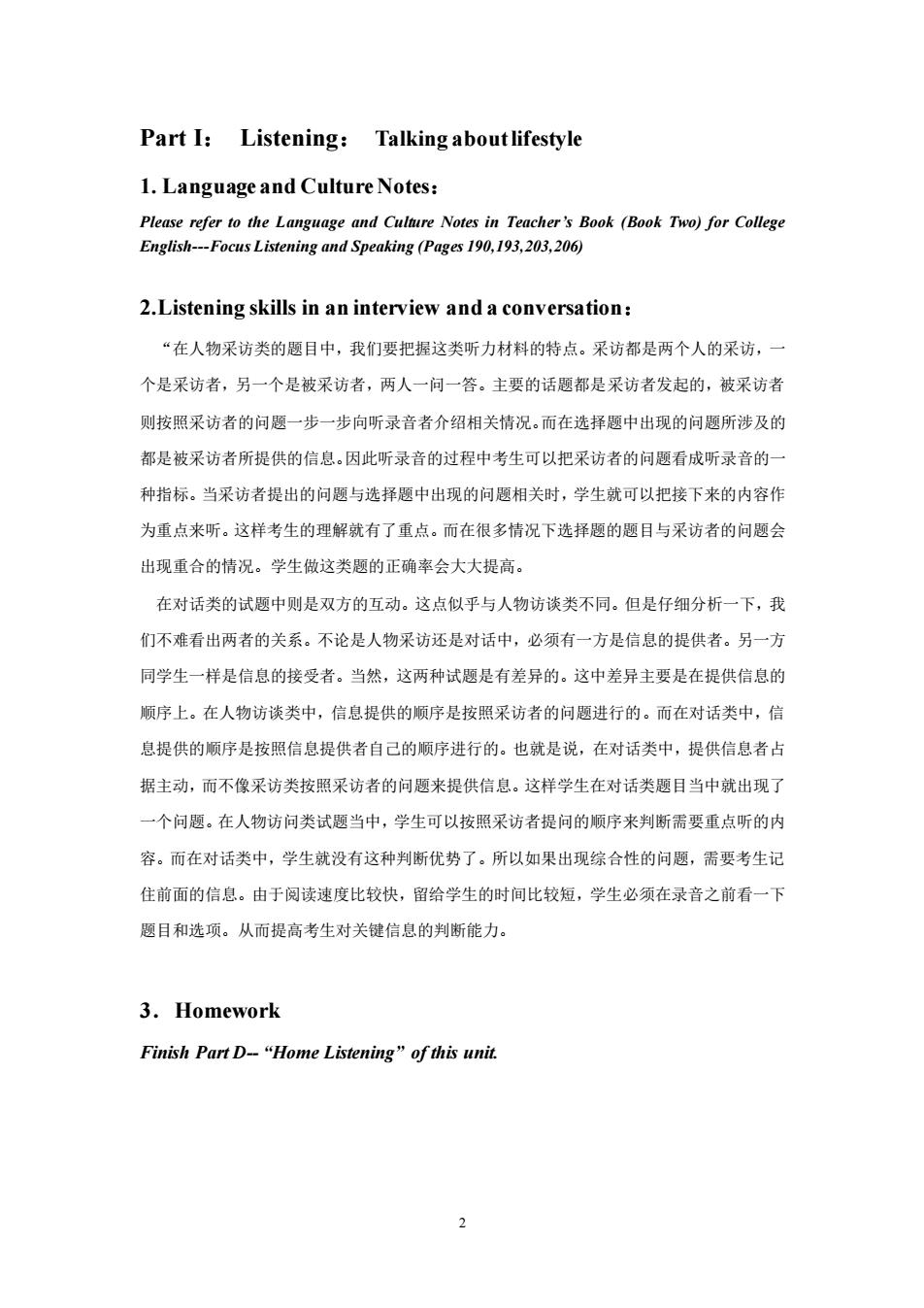
Part I:Listening:Talking about lifestyle 1.Language and Culture Notes: Please refer to the Language and Culnre Notes in Teacher's Book (Book Two)for College English---Focus Listening and Speaking (Pages 190.193.203.206) 2.Listening skills in an interview and a conversation: “在人物采访类的题目中,我们要把握这类听力材料的特点。采访都是两个人的采访,一 个是采访者,另一个是被采访者,两人一问一答。主要的话题都是采访者发起的,被采访者 则按照采访者的问题一步一步向听录音者介绍相关情况。而在选择题中出现的问题所涉及的 都是被采访者所提供的信息.因此听录音的过程中考生可以把采访者的问题看成听录音的一 种指标。当采访者提出的问题与选择题中出现的问愿相关时,学生就可以把接下来的内容作 为重点来听。这样考生的理解就有了重点。而在很多情况下选择题的题目与采访者的问题会 出现重合的情况。学生做这类题的正确率会大大提高。 在对话类的试题中则是双方的互动。这点似乎与人物访谈类不同。但是仔细分析一下,我 们不难看出两者的关系。不论是人物采访还是对话中,必须有一方是信息的提供者。另一方 同学生一样是信息的接受者。当然,这两种试题是有差异的。这中差异主要是在提供信息的 顺序上。在人物访谈类中,信息提供的顺序是按照采访者的问题进行的。而在对话类中,信 息提供的顺序是按照信息提供者自己的顺序进行的。也就是说,在对话类中,提供信息者占 据主动,而不像采访类按照采访者的问题来提供信总。这样学生在对话类题目当中就出现了 一个问题。在人物访问类试题当中,学生可以按照采访者提问的顺序来判断需要重点听的内 容。而在对话类中,学生就没有这种判断优势了。所以如果出现综合性的问题,需要考生记 住前面的信息。由于阅读速度比较快,留给学生的时间比较短,学生必须在录音之前看一下 题目和选项。从而提高考生对关健信息的判断能力。 3.Homework Finish Part D-“Home Listening”of this unit
2 Part I: Listening: Talking about lifestyle 1. Language and Culture Notes: Please refer to the Language and Culture Notes in Teacher’s Book (Book Two) for College English---Focus Listening and Speaking (Pages 190,193,203,206) 2.Listening skills in an interview and a conversation: “在人物采访类的题目中,我们要把握这类听力材料的特点。采访都是两个人的采访,一 个是采访者,另一个是被采访者,两人一问一答。主要的话题都是采访者发起的,被采访者 则按照采访者的问题一步一步向听录音者介绍相关情况。而在选择题中出现的问题所涉及的 都是被采访者所提供的信息。因此听录音的过程中考生可以把采访者的问题看成听录音的一 种指标。当采访者提出的问题与选择题中出现的问题相关时,学生就可以把接下来的内容作 为重点来听。这样考生的理解就有了重点。而在很多情况下选择题的题目与采访者的问题会 出现重合的情况。学生做这类题的正确率会大大提高。 在对话类的试题中则是双方的互动。这点似乎与人物访谈类不同。但是仔细分析一下,我 们不难看出两者的关系。不论是人物采访还是对话中,必须有一方是信息的提供者。另一方 同学生一样是信息的接受者。当然,这两种试题是有差异的。这中差异主要是在提供信息的 顺序上。在人物访谈类中,信息提供的顺序是按照采访者的问题进行的。而在对话类中,信 息提供的顺序是按照信息提供者自己的顺序进行的。也就是说,在对话类中,提供信息者占 据主动,而不像采访类按照采访者的问题来提供信息。这样学生在对话类题目当中就出现了 一个问题。在人物访问类试题当中,学生可以按照采访者提问的顺序来判断需要重点听的内 容。而在对话类中,学生就没有这种判断优势了。所以如果出现综合性的问题,需要考生记 住前面的信息。由于阅读速度比较快,留给学生的时间比较短,学生必须在录音之前看一下 题目和选项。从而提高考生对关键信息的判断能力。 3.Homework Finish Part D-- “Home Listening” of this unit
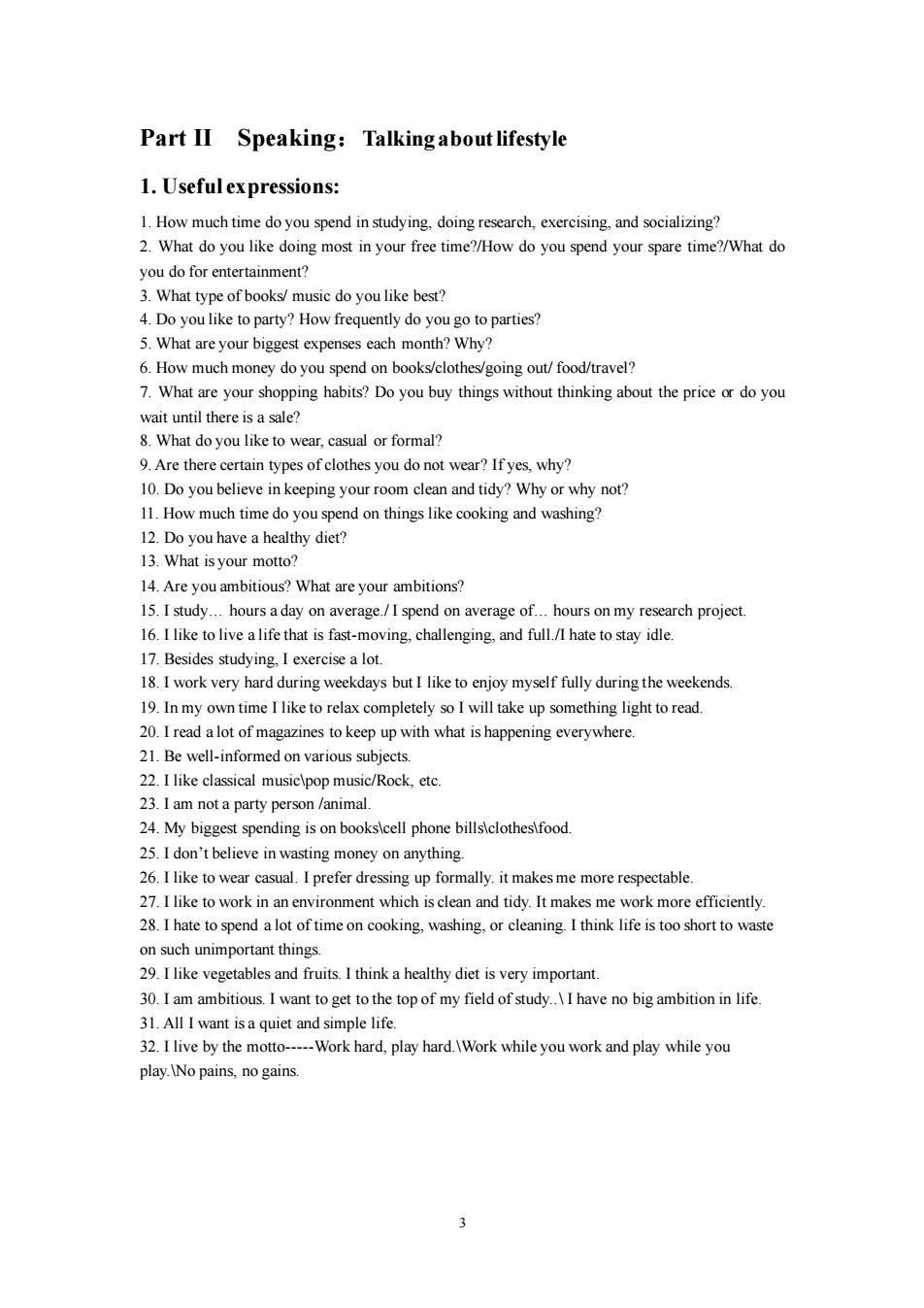
Part II Speaking:Talkingabout lifestyle 1.Useful expressions: 1.How much time do you spend in studying.doing research,exercising.and socializing? 2.What do you like doing most in your free time?/How do you spend your spare time?/What do you do for entertainment? sic do you like best? 4.Do you like to party?How frequently do yougo to parties? 5.What are your biggest expenses each month?Why? 6.How much money do you spend on books/clothes/going out/food/travel? 7.What are your shopping habits?Do you buy things without thinking about the price o do you 9.Are there certain types of clothes you do not wear?Ifyes,why? 10.Do you believe in keeping your room clean and tidy?Why or why not? 11.How much time do you spend on things like cooking and washing? 12.Do you have a healthy diet? 13.What is you 14.Are you ambitious?What are your ambitions? 15.I study...hours aday on average./I spend on average of.hours on my research project 16.I like to live alife that is fast-moving,challenging,and full./I hate to stay idle. 17.Besides studying.I exercise a lot. ork very hard myself fully during the weekends 9.Inmy own time I like to relax completely soI will take up something light to read. 20.I read alot of magazines to keep up with what is happening everywhere. 21.Be well-informed on various subjects. 22.I like elassical music\pop music/Rock,ete. 23.Iam not a party person /animal. 24.My biggest spending ison bookscell phone. 25.I don't believe in wasting money on anything 26.I like to wear casual.I prefer dressing up formally.it makes me more respectable. 27.I like to work in an environment which is clean and tidy.It makes me work more efficiently. 28.I hate to spend a lot of timeon cooking,washing,or cleaning.I think life is too short to waste rtant things 贺ed its e曲d的veY mornt 30.I am ambitious I want to get tothe top of my field of study\I have no big ambition in life. 31.All I want isa quiet and simple life. 32.I live by the motto---Work hard,play hard.\Work while you work and play while you play.No pains,no gains
3 Part II Speaking:Talking about lifestyle 1. Useful expressions: 1. How much time do you spend in studying, doing research, exercising, and socializing? 2. What do you like doing most in your free time?/How do you spend your spare time?/What do you do for entertainment? 3. What type of books/ music do you like best? 4. Do you like to party? How frequently do you go to parties? 5. What are your biggest expenses each month? Why? 6. How much money do you spend on books/clothes/going out/ food/travel? 7. What are your shopping habits? Do you buy things without thinking about the price or do you wait until there is a sale? 8. What do you like to wear, casual or formal? 9. Are there certain types of clothes you do not wear? If yes, why? 10. Do you believe in keeping your room clean and tidy? Why or why not? 11. How much time do you spend on things like cooking and washing? 12. Do you have a healthy diet? 13. What is your motto? 14. Are you ambitious? What are your ambitions? 15. I study… hours a day on average./ I spend on average of… hours on my research project. 16. I like to live a life that is fast-moving, challenging, and full./I hate to stay idle. 17. Besides studying, I exercise a lot. 18. I work very hard during weekdays but I like to enjoy myself fully during the weekends. 19. In my own time I like to relax completely so I will take up something light to read. 20. I read a lot of magazines to keep up with what is happening everywhere. 21. Be well-informed on various subjects. 22. I like classical music\pop music/Rock, etc. 23. I am not a party person /animal. 24. My biggest spending is on books\cell phone bills\clothes\food. 25. I don’t believe in wasting money on anything. 26. I like to wear casual. I prefer dressing up formally. it makes me more respectable. 27. I like to work in an environment which is clean and tidy. It makes me work more efficiently. 28. I hate to spend a lot of time on cooking, washing, or cleaning. I think life is too short to waste on such unimportant things. 29. I like vegetables and fruits. I think a healthy diet is very important. 30. I am ambitious. I want to get to the top of my field of study..\ I have no big ambition in life. 31. All I want is a quiet and simple life. 32. I live by the motto-----Work hard, play hard.\Work while you work and play while you play.\No pains, no gains
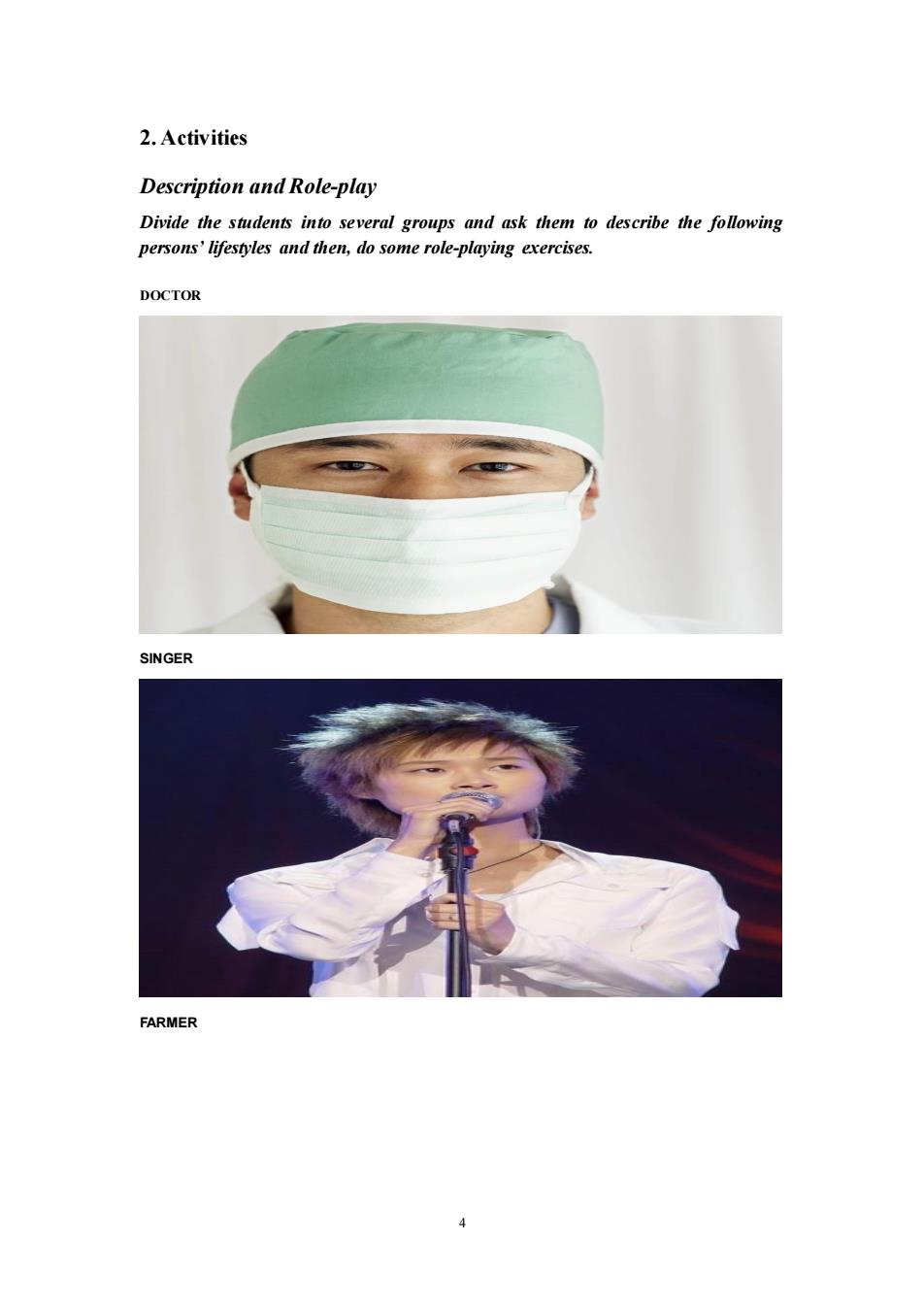
2.Activities Description and Role-play Divide the students into several groups and ask them to describe the following persons'lifestyles and then,do some role-playing exercises. DOCTOR SINGER FARMER
4 2. Activities Description and Role-play Divide the students into several groups and ask them to describe the following persons’ lifestyles and then, do some role-playing exercises. DOCTOR SINGER FARMER
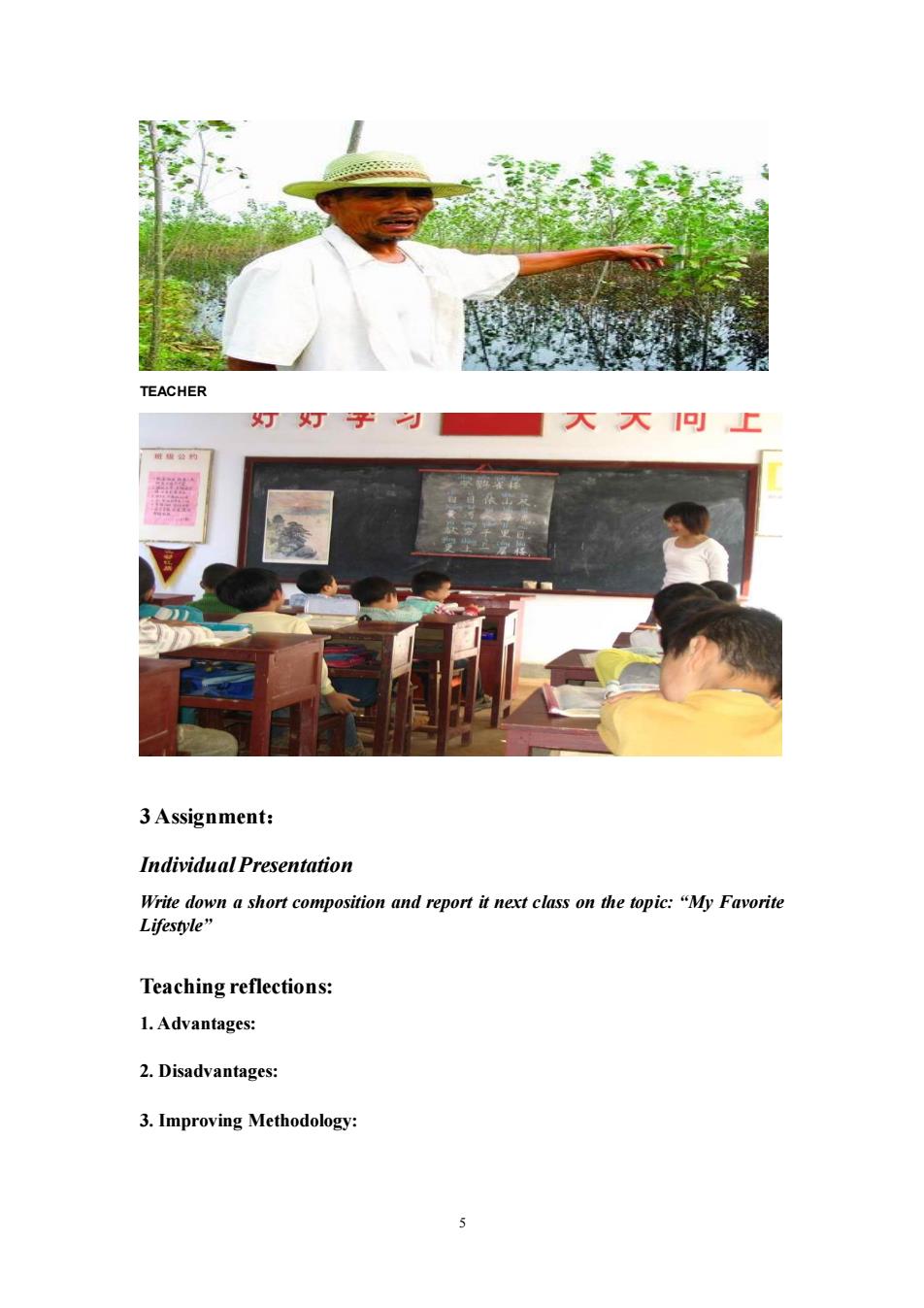
TEACHER 3 Assignment: Individual Presentation Write down a short composition and report it next class on the topie:"My Favorite Lifestyle” Teaching reflections: 1.Advantages: 2.Disadvantages: 3.Improving Methodology:
5 TEACHER 3 Assignment: Individual Presentation Write down a short composition and report it next class on the topic: “My Favorite Lifestyle” Teaching reflections: 1. Advantages: 2. Disadvantages: 3. Improving Methodology: